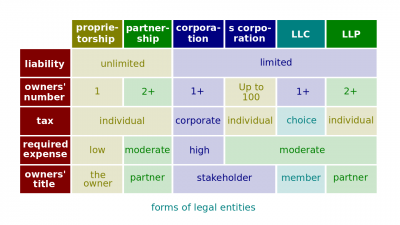Difference between revisions of "Limited liability company"
| Line 1: | Line 1: | ||
| − | [[Limited liability company]] (better known by its acronym, [[LLC]]; hereinafter, ''LLC'') is a [[legal entity]] that does not issue [[stock]]s, but is owned by one or more members, who are granted [[limited liability]]. That means that the members are only liable to the extent of their investments. | + | [[File:Org-forms.png|400px|thumb|right|[[Legal organizational entity]]]][[Limited liability company]] (better known by its acronym, [[LLC]]; hereinafter, ''LLC'') is a [[legal entity]] that does not issue [[stock]]s, but is owned by one or more members, who are granted [[limited liability]]. That means that the members are only liable to the extent of their investments. |
Revision as of 10:17, 3 November 2019
Limited liability company (better known by its acronym, LLC; hereinafter, LLC) is a legal entity that does not issue stocks, but is owned by one or more members, who are granted limited liability. That means that the members are only liable to the extent of their investments.
Definitions
According to College Accounting: A Practical Approach by Slater (13th edition),
- Limited liability company. A form of business organization that is owned by one or more members. Members are only liable to the extent of their investments.
According to Fundamentals of Financial Management by Eugene F. Brigham and Joel F. Houston (15th edition),
- Limited liability company. A popular type of organization that is a hybrid between a partnership and a corporation.
Related concepts
- Bookkeeping. Recording, filing, and retrieving of financial data, as well as producing those financial reports that are required by laws.
